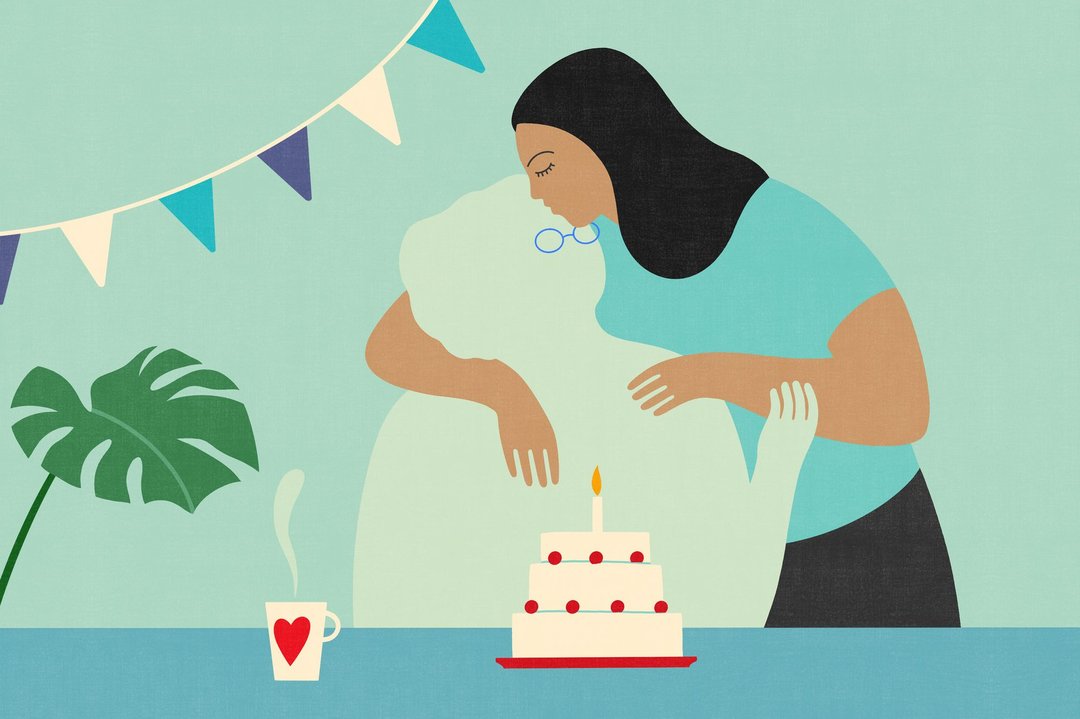
By Elizabeth Bernstein
May 12, 2023
This Mother’s Day, Kristin Anderson has something special planned: a long walk on the beach, followed by a visit to her mom’s favorite boardwalk ice-cream stand. On the way home, she’ll crank up a playlist of her mom’s beloved tunes and sing along.
She’ll do it all by herself. Her mother died from cancer almost 17 years ago, when Ms. Anderson was 12.

ILLUSTRATION BY CAROLE HÉNAFF
“I used to be jealous of people who had their mothers and would go and celebrate with them,” says Ms. Anderson, who is 29. “This makes me feel less alone.”
Grief hurts every day. It often looms larger on holidays—especially ones designed to celebrate the person who is gone: Mother’s Day, Father’s Day, a birthday or wedding anniversary. And the onslaught of holiday greetings, ads and social-media posts can make it harder.
Friends and family don’t always understand, especially if they haven’t lost a person close to them. They might dismiss our feelings—unintentionally—by encouraging us to cheer up: “You should be grateful your dad lived so long.” Or: “Your mom would want you to be happy.”
There’s no single good approach to celebrating, or enduring, a holiday after a loved one is gone, says George Bonanno, who directs the Loss, Trauma, and Emotion Lab at Columbia University’s Teachers College. Some people prefer to ignore the day. Others embrace it and try to make some meaning. Many take it as it comes.
Dr. Bonanno’s research shows that people who are willing to adjust their approach according to how they feel in the moment, or adopt a “flexibility mind-set,” cope better.
“Try something and see if it works for you,” he says. “If it doesn’t, try something else.”
Ms. Anderson says she was numb with grief in the years soon after her mom died. On Mother’s Day, like most holidays, she did “a lot of ignoring and pretending it didn’t happen,” distracting herself with friends or going to the stable and riding all day.
That eventually became too hard, says Ms. Anderson, a professional equestrienne in North Brunswick, N.J.
When she was 16, she had a Mother’s Day meltdown, sobbing for hours. Afterward, she asked two friends to accompany her to the beach on the Jersey Shore where she’d spent summer vacations with her family. She walked for hours, tossing a bottle into the water with a long letter to her mom.
Now, she takes a solo trip to the beach each Mother’s Day, looking for sea glass as her mom taught her to do. She also celebrates her mom’s birthday, often putting a candle in a piece of her mom’s favorite strawberry shortcake, then eating it alone. She’s held full-blown parties for her mother, too, including a large one at Disney World on what would have been her mom’s 60th birthday.
“I can still celebrate the things she would want to do even if she isn’t physically here,” says Ms. Anderson. “It helps keep her spirit alive in me.”
I asked readers of my column how they celebrate a holiday when they’re missing a deceased loved one. Many described planning an activity that the person loved to do, such as going to a museum, watching a favorite movie or playing a sport. (On Father’s Day, I plan to go sailing.) Others said they give to charity, post tributes on social media or contact family or friends to share favorite memories. A few write heartfelt cards, then drop them off at the cemetery or a spot in nature.
Here are some other strategies for coping with loss on a holiday.
Make meaning
Do something that connects you to your loved one, such as making his or her favorite meal, looking through photos or doing an activity you enjoyed together.
You can also honor the person by helping someone else. Volunteer or donate to a charity. Help a single mom or bring flowers to a nursing home. Find someone to mentor, just as your dad did.
“Grief is often a very passive feeling; we feel like death was done to us,” says David Kessler, a grief expert and founder of Grief.com, who has written six books on the topic. “Doing something active always makes us feel better.”
Alone is fine
Others might not want to join you, even if they’re grieving too. That’s normal. Everyone grieves in a unique way. Remember that this celebration is about your relationship with your loved one. Respect others’ wishes, but don’t let that stop you from marking the day the way you want.
Have a plan B
Grief can be unpredictable. Sometimes what you’ve planned and what you feel like doing when the time comes might not match up.
Make your best plan, then have a backup, Mr. Kessler suggests. Want to hit the holiday party and give a toast to your loved one while sipping his or her favorite cocktail? Tell yourself that it’s OK if you stay home and have that drink while watching his or her favorite movie instead, if it all becomes too much.
It’s OK to ‘cope ugly’
Sometimes a holiday, especially one soon after a loss, is too hard to celebrate. You might not even want to get out of bed. That’s not unusual, says Dr. Bonanno, author of “The Other Side of Sadness.” Don’t beat yourself up about it.
Some coping strategies might seem ugly, but work as a temporary fix. So stay in bed and cry. Binge-watch a day of TV. Pig out (just for the day) on junk food. Have a stiff drink. Or two.
Externalize the loss
Talk about your loved one. Call friends and family and share stories. Send photos or videos around via text. Write a tribute on social media. Bring flowers to the cemetery.
“Say their name and tell their stories,” says Mr. Kessler. “As long as you do, they never fully die.”
Write to Elizabeth Bernstein at Elizabeth.Bernstein@wsj.com
Dow Jones & Company, Inc.


